- Home
- Francine Mathews
Death in the Off-Season Page 9
Death in the Off-Season Read online
Page 9
Merry descended the stairs, stepping over Tabitha, the calico cat, and her latest litter of kittens, and picked her way through a collection of prewar ladies’ hats on her way to the kitchen. Ralph Waldo had raised her father here, and when Merry’s mother and brother died, she and John had moved back into the house. The clutter drove her father mad. The prospect of clearing it away, however, was too daunting. Every winter began with a vow to sort through the accumulation of years, and every spring found the house in its usual state. Nothing had changed; it had merely increased.
“What’s for dinner, Ralph?”
Her grandfather, splendid in a red butcher’s apron, held a fillet knife in one hand. There was a smell of lemons and freshly ground pepper. Ralph turned and smiled when he saw her.
“Bluefish. With tomatoes and basil. Potato salad. Iced tea with mint. There may be some ice cream left, but then again, you may have eaten it when I wasn’t looking.”
“I’m starved. Got any cheese?”
“You can look.”
Merry considered the icebox, which sported the profusion and decay of the rest of the house, and gave up. She pulled out a rush-seated chair and slumped over the table, feeling cranky.
Her grandfather raised an eyebrow and turned back to his fillet. “You’re looking cranky, Meredith. We’d better start with the iced tea.”
“Dad gave my case away.”
Ralph stopped his work on the fish and shook his head. “That boy,” he said. “Never fails to lay the wrong foot.”
“So you think I could have done it?”
He looked at her: mouth wistful and uncertain under the cool green eyes, hair tousled like a child’s from sleep. “Of course you could have done it. I intend to tell your father so when I see him.”
“Don’t humor me, Ralph. This is important. I was nervous as hell out there today; I almost couldn’t look the corpse in the face. Do you think I’m tough enough to handle a murder?”
“Toughness has its downside, Meredith. It can keep you from feeling. Assurance is what you want; and that’ll come with experience. If you believe in yourself, that is.” He shot her what she called his wrath-of-God glance from under his white eyebrows.
“I have to get Dad to believe in me first.”
“I do not agree,” he said firmly. “Work on your self-confidence, and you’ll give him a reason to back you. You’ve never quite trusted your abilities, Meredith Abiah, and for the life of me I cannot see why. You’re smart, you’re dedicated, you’re thorough—and better than that, you’ve got the best instincts I’ve seen in a long time. I flatter myself they’re hereditary.” He pulled out a chair and sat down opposite her, one gnarled hand supporting his chin and the other stroking her blonde head. The unruly waves were springy beneath his fingers, like ferns or feathers. “What is it you’re so afraid of?”
She laid one cheekbone on the table’s scarred surface and let herself be a child. With Ralph, she was open as she never could be with her father. “Failing.”
“—To solve your first murder? Or to fill your brother’s shoes?”
“There’s some of that.”
“Why?”
“Dad was so proud of him, Ralph. Of his son. He still is. I’m always struggling to be what I’m not.”
“Bullshit,” he retorted. “You’re more your father’s child than Billy ever was. He was one of the loves of my life, Meredith, but he had your mother’s romanticism and her impetuosity. That’s why he enlisted and jumped on an improvised explosive device as it went off. You’re too rational to be a hero. That will take you far in the police business.”
Merry laughed hollowly. “Unless I’m fired. I lost my temper in Dad’s office. I was probably on a caffeine-and-sugar high from Fog Island.”
“So we’ll call it my fault.”
“He mentioned Mom, and I said something stupid.” Merry ran her finger around the rim of her iced tea tumbler, her face flushing as she spoke. The tea was the color of mahogany and smelled like the inside of a cedar closet.
Ralph got up and busied himself at the counter. “How bad was it?”
“I told him I wouldn’t slit my wrists the first time things got rough. Or words to that effect.” Her voice was very small. “I thought he’d punch his fist through the door.”
Ralph set down his fillet knife and wiped his hands on his apron. “You’ve had more intelligent moments, Meredith. Your mother was the sweetest woman who ever lived.”
“You think I don’t know that?” she burst out. “You think I don’t feel like crap? And the truth is that he’s partly right. He shouldn’t trust me. I nearly flunked out of my forensic anthropology class. I can’t stand to look at ‘human remains.’ I hate the smell, the bloating, the obscenity of a murdered body.”
She pushed aside her glass of tea. “I follow every case in the state with a horrible fascination. Dad thinks I’m morbid. Other cops can depersonalize murder—they talk about the killing’s statistical group, or the modus operandi of a case compared to one last year—but I can’t. I think about the victim. What his life might have been like. What she must have thought as she was dying. Whether he died in fear and pain, alone. And I think about how I’d have felt if it happened to me.”
“You ought to. A lost life should mean something.”
“That’s why I can’t understand Peter Mason’s reaction,” Merry said. “He’s so cold, Ralph. It’s as if he’s dismissed the fact of his brother’s death and moved on to worrying about his harvest. It’s not normal. In fact, it makes me angry. So maybe I shouldn’t be in the police business.”
“‘Any man’s death diminishes me, because I am involved in mankind,’” Ralph Waldo mused. “I don’t think that’s bad, Meredith. I think it’s a form of grace too often lacking in police work.”
The backyard screen door swung open abruptly, and Merry looked over her shoulder. John Folger stepped into the kitchen, nodded to her wordlessly, and handed a brown paper bag to Ralph. “Picked up some melons from the produce truck in town this morning. Whole office smells like them.”
“Thanks, son,” Ralph said. “Well, I’d better get these fish on the fire.” He slathered the fillets with mayonnaise and then disappeared into the foggy yard, where a charcoal grill smoked gently.
“I’m sorry for what I said to you this morning,” Merry attempted. “All of it. You’re probably right to give the case to somebody with more experience. I was just so tired, so—”
“—fed up with banging your head against the wall,” her father said. “I know. I used to have to fight Ralph for every case I worked on. I should be better at this than he was.” He dropped his keys on the kitchen counter and stood looking at them blankly for an instant. “But we don’t learn, Merry. I look at you and I see the little girl who used to make me bury dead seagulls in the backyard. I see the young woman who dragged around for months when her brother didn’t come home from war. Death makes us careful with our children. I don’t want anything, ever, to happen to you. You’re all I’ve got left. You’re the most important thing in my life. And so I protect you too much.” He put his hand on her shoulder. “Don’t resign, kid.”
“Sometimes it seems like the only thing left to do.”
“You could try working on the Mason murder instead. I told Bailey I needed him on the vandalism case.”
“I bet he loved that,” she said carefully.
“He didn’t share his feelings with me.”
“Probably a good thing. Thanks, Dad. You won’t be sorry.”
Her chief kissed the top of her head lightly, something he rarely did. “Eat your dinner and get back out there.” He made his way through the cluttered kitchen to the stairs, cursing as his shin met the edge of a blacksmith iron.
Merry shot out of her seat and thrust her head around the screen door. “He gave me the case, Ralph! What in the hell d
o I do now?”
Upstairs, as he folded his discarded uniform and reached for a towel, John Folger smiled.
Chapter 10
Two hours later, bouncing over the sandy trail through the moors to Altar Rock, Merry made a decision. Peter Mason’s safety was paramount, and therefore she would have to operate on the assumption that he was the killer’s intended victim and his brother an unlucky double. If in the course of investigation she was proved wrong—if Rusty in fact was the target—she’d have erred only on the side of caution.
She had done the obvious where Rusty Mason was concerned—furnished a description of him to the ferry service, the taxi stands, and the airlines in the hope that someone would identify him and she could trace his movements. She had sent Howie to the rental car companies out at the airport to ask whether Rusty Mason had picked up his ride there. And she had told Clarence Strangerfield to arrange for divers to search the kettle hole ponds that dotted Nantucket over the next few days. It was possible the killer had just submerged his weapon in one of them. Short of a garage-to-garage hunt, she was unlikely to find the damaged car any other way.
Clarence had texted her the results of his bog search. Three hours of combing an area within a hundred-yard radius from the body, with a party of three sergeants on hands and knees, had produced fifty-six cents in pennies, nickels, and dimes; a multitude of scratches; a rusted piece of metal, presumably from Peter’s harvesting equipment; crimson juice stains on four uniforms; an ancient beer bottle; and colds in several heads. Clarence had vacuumed the clothes and body for fibers before they were sent to the forensic center on the mainland. The pockets were empty, as though Rusty Mason had left Brazil with only the clothes on his back. His watch, however, had stopped at two forty-seven.
“That doesn’t mean he went into the water then, Merry, only that the movement stopped at that point.”
“Fine,” she’d said impatiently, wondering why the man had traveled to the island like a day-tripper, without a wallet, passport, or cell phone, not to mention a ticket stub—and recognized it was impossible. Either he’d left all his belongings in a hotel room on the mainland, or the murderer had gotten rid of them. Something else to look for.
Clarence had found a single print on the wooden button; they did not match the dead man’s, nor those taken from Rafe da Silva’s and Peter Mason’s fingers that morning. “So we’ve got a non-suspect ident,” she’d mused. A print from an unknown person—who might be the murderer. Or not.
“Ah’ll search the database,” Clarence told her. “Maybe we’ll get lucky.”
Finally, there were the photographs taken at the scene. She lingered over the shot of Rusty Mason’s dead face, revising her earlier opinion of his resemblance to his brother. His hair was brighter brown, shot with red where Peter’s tended to black, and the lines on the face were deeply etched.
“Looks like he lived hard, Clare,” she’d said.
Now, as she guided the car along the still-foggy trail through the moor toward Peter Mason’s house, it was Rafe da Silva she was thinking of. The prospect of bumping into him gave her a thrill of terror and nausea coupled with wild hope. Despite the smallness of the island, the two of them had been out of touch for years—because Rafe wanted it that way. She had tried to pump her grandfather for information over dinner, to little purpose.
“Ralph, you know anything about how Rafe da Silva wound up out at Mason Farms?”
“Nope. But I imagine like most folks he answered a want ad.”
“The da Silvas are watermen. Not farmers.”
“In this economy, you’re lucky if you’re apt for more than one trade. Mason Farms pays a salary, and I’ll bet the board is thrown in. Shoot,” Ralph had said, as he pulled a bone from the bluefish. “You know old Jose hasn’t spoken to Rafe since he got back from New Bedford, Meredith. He’s not likely to have him on his boat. The best Rafe can hope for is that the old coot will kick off one of these days and leave him the scalloper. Not that I wish the man ill. Still, I get tired of fellows who’ve no time for their own sons. Death ends enough conversations.”
“They just seem like an odd pair,” Merry had said. “Mason and Rafe, I mean.”
Ralph had grunted assent, his attention on the beefsteak tomato he’d picked from the plants next to the fence. He’d held it in the palm of his right hand, a paring knife in his left, and sliced the dark red flesh into wedges. Tomato juice had run over his fingers and dripped to his elbow. He’d mopped at it with his napkin. “You thinking Rafe went for Peter and got his brother?” Ralph had said.
“Ralph! That’s crazy. Rafe’s not the killing type, whatever people think.”
“I know that. I’m just wondering why you’re worried about what the man does for a living.”
Because i want to know why he’s so distant toward me, Merry said to herself. It’s all part of the changes in his life since Iraq, since nothing seemed right to either of us with Billy gone. I’m just worried about him. And I don’t like him so close to another murder, either. He’s got some pretty deep scars.
Somewhere behind the fog, the sun was in decline. Merry switched on her low beams and saw the air solidify in front of her, dual arcs of opacity thrusting into the darkness past the radar station. Her police radio squawked static suddenly into the quietness of the car, and she jumped involuntarily in her seat. She reached over and turned it off, then thought better of it and turned it back on, at low volume. A car passed her heading back to town, its high beams flooding a wall of fog, the motorist hunched over the wheel in a desperate effort to see. Tourist, Merry thought. Nobody used to fog would throw on the high beams. Must be lost, too; there was no good reason to be driving back in the moors tonight. Other than Mason Farms, the road led only to Nantucket Conservation Foundation lands. As she approached the driveway to the farm, she frowned, puzzled. A crowd of vans and cars had pulled up, helter-skelter, near the turnoff.
“Great night for a barbecue, Mason,” she said to herself. She made the turn into the driveway and came to an abrupt halt. A crush of people with cameras were huddled near the yellow police cordon, flashes exploding in the darkening fog. Merry threw the Explorer into neutral and pulled up the handbrake, searching for the Nantucket police sergeant Clarence had left on duty. He was nowhere to be seen.
As she got out of the car, a knot of excited gawkers broke from the spot-lit area in front of a television crew and moved toward her in a wave. Merry stopped dead. “Seitz,” she muttered. “Of course.”
Howie Seitz was in the midst of his fifth exclusive interview, his trademark smile in full force. He stooped slightly to hear the questions posed by a breathless blonde in red linen, who held her earphones in one manicured hand and a microphone in the other. Merry glanced at the camera crew’s call sign. A Boston station. They must have helicoptered when the news hit the wire.
She marched over to the charmed circle, reached out a hand, and said, “Sorry, ma’am, we’ve got work to do here. Seitz!”
“Detective Folger! Hey, Madeleine, this is the woman who’s handling the investigation!”
The blonde newswoman turned to Merry eagerly and shoved a microphone next to her chin. “Could you comment on the death of Rusty Mason, Detective? Were drugs involved? Do we know whether this was an accident, or murder?”
“We’d know a lot sooner if you’d let us do our job,” Merry said, scowling. “Now turn that thing off and leave my intern alone.”
“Cut that, Steve,” the blonde said coolly, turning to her cameraman. “We’ll have to go with the kid.”
Merry took Howie by the elbow and marched him over to her car. She reached into the back and pulled out a bullhorn. “Start talking with this,” she said. “I suggest the phrase ‘Clear the area.’ It generally works. If you’re talking to anyone—anyone at all, do you understand me?—when I come back down this driveway, you’re fired.”
> “I’m going back to school at the end of the week, for Chrissake,” Howie said.
“And you can leave without a recommendation, too,” Merry shot back. She turned on her heel and pushed her way through the crowd.
The quarter-mile of driveway was relatively clear. At the geranium-colored door, however, another knot had gathered, hoping for a glimpse of Peter Mason. Merry glanced at it and paused, thinking. Then she turned and headed around the house to the barn. A light glowed from the loft.
After the chaos at the gate, the barn’s stillness seemed unnatural. Merry paused at the huge, half-open doors, allowing her eyes to adjust to the dimness of the interior. The sweet smell of hay blended with the mustiness of sheep’s urine and old wood rising from the floor. She sneezed once, and then again. A chair scraped against the flooring over her head, and heavy footsteps crossed the platform. From the barn’s far corner, Merry heard the unoiled hinges of a door whine open. She turned in the direction of the sound, and saw a staircase leading from the threshing floor to the hayloft.
“Turn right around and head back where you came from,” a man’s voice said. “This is private property.”
“Rafe.” Her voice was tremulous. “It’s Merry.”
He paused, a dark outline against the glow of the doorway. “Hell,” he said, “thought you were the Press.”
Rafe’s room still looked like the hayloft it had once been. He showed her the bolted trapdoor in the flooring, partially covered by a trunk that served as his coffee table. A single bunk in one corner was neatly made up, and a desk across the room was strewn with papers—feed orders, wool counts. The lamp hanging from the low rafters sent swinging shadows against the walls, but threw steady light on the armchair Rafe had clearly just vacated. Next to it on the floor stood a beer bottle and an open book, facedown. The windows cut in three walls were bare of curtains. She imagined the sun pouring in on clear mornings, slanting across the sharp planes of Rafe’s face, causing his dark brows to furrow over crinkled lids, and then corrected her mental picture. The sheep on the property meant he’d be up long before dawn, something farming had in common with fishing. Maybe his new life wasn’t so different from the old after all. As if he felt her eyes on him, Rafe turned and looked at her, and she dropped her gaze. The sight of his face undid her.

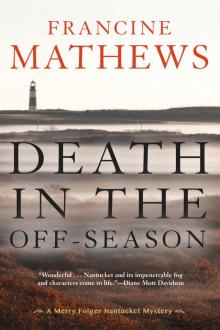 Death in the Off-Season
Death in the Off-Season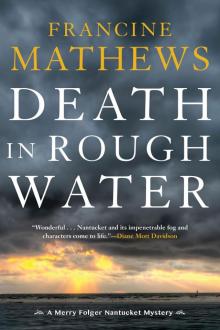 Death in Rough Water
Death in Rough Water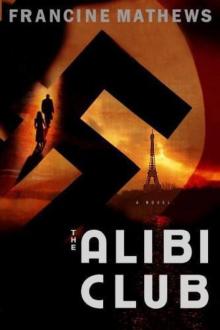 The Alibi Club
The Alibi Club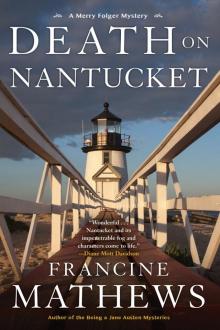 Death of a Wharf Rat
Death of a Wharf Rat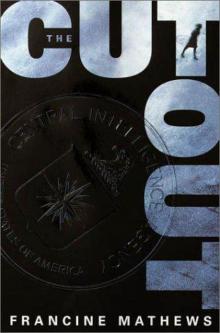 The Cutout
The Cutout The Secret Agent
The Secret Agent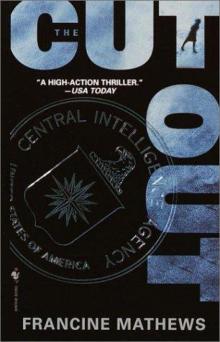 The Cutout cc-1
The Cutout cc-1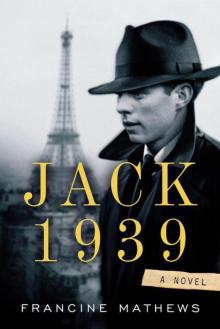 Jack 1939
Jack 1939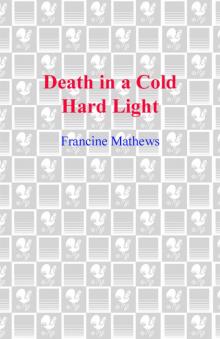 Death in a Cold Hard Light
Death in a Cold Hard Light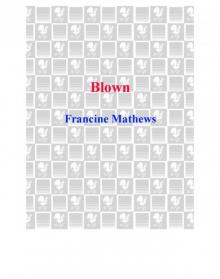 Blown
Blown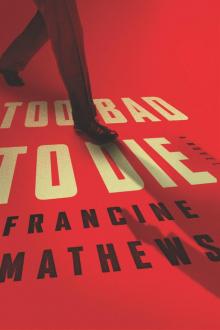 Too Bad to Die
Too Bad to Die